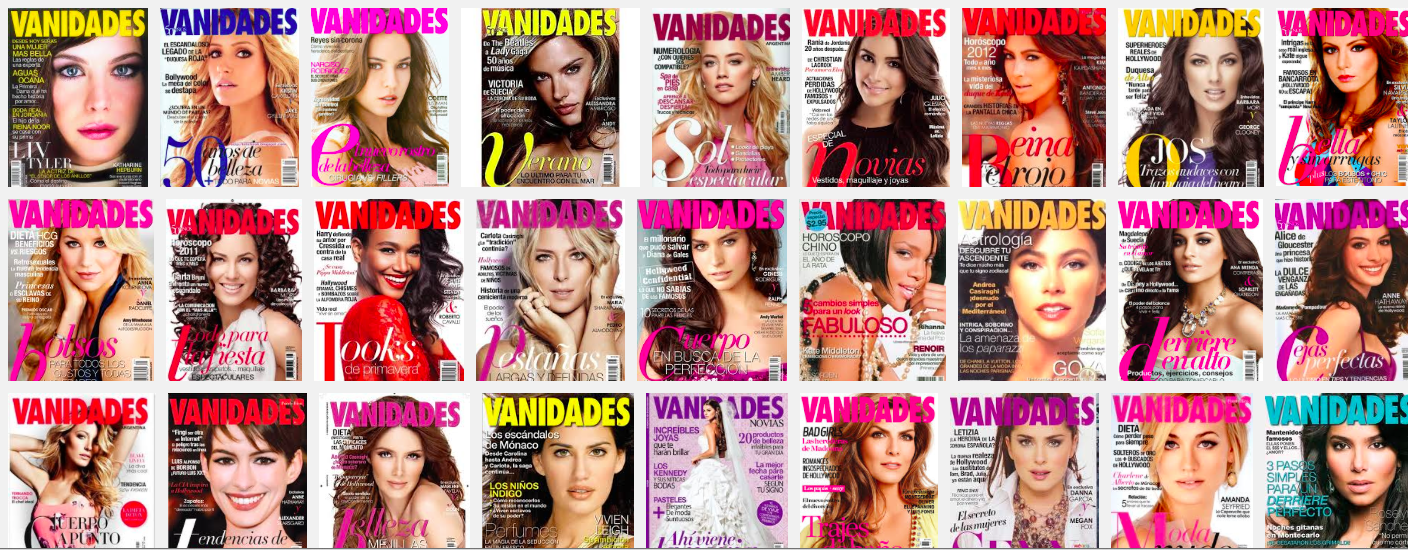This is the weekend edition of TheMarioBlog and will be updated as needed. The next blog post is Monday, August 11.
Cover of Vanidades for February 7, 1942
Very early color use in these fashion pages of Vanidades 1942
The pacing of Vanidades is perfect, with celebrity/entertainment news coming at the end. Here “Farewell to Carole Lombard”
Fiction an important part of the Vanidades content: a serial novel titled ELLA (Her)

Anne took this picture of “the only ‘newstand’ I could find at the Havana airport”.
Another photo by Anne of “the beautiful old leather-bound books from the bookstalls”.
A fortuitous meeting with writer, journalist and Columbia University adjunct professor Anne Nelson led me to this copy of Vanidades. As it happened, Anne visited Havana last year and found a copy of this Vanidades, dated February 7, 1942.
“I found the magazine on a one of the bookstalls in the Plaza de Armas in Havana Vieja. It was the only place in the country I saw anything recognizable as “journalism” — except, like this magazine, the “news” was over 60 years old.”
“These things move in circles, Mario,” Anne told me. “So I think this magazine belongs with you.”
What a treat it was to get this present from Anne as we drank coffee one sunny morning outdoors at an Upper West Side cafe. Anne pulled the Vanidades edition from her bag and she could see the emotion in my face. This was a magazine that Cuban women waited for. I know that both my grandmothers and my mother did. It was always a coffee table fixture in our living room. But I had no idea that the edition of 72 years ago (indeed, older than I am) could have a color cover, and so many color pages (mostly for fashion—smart move).
What resonated with both Anne and me was the fact that the content could probably go toe to toe with a similar publication today: a mix of lifestyle stories, general interest pieces fashion spreads (“Do Wars Influence How Women Dress?”), health (a yoga double pager headlined “There is Art in being Beautiful and Healthy”), relationships (“Do Men Talk Too Much?”), fiction (the start of a serial titled Ella (Her), by Rider Haggard, and, towards the end, two pages of the celebrity gossip that seems to dominate similar magazines today. In the celebrity spread, “The Tragic Death of Carole Lombard”. Finally, the food section and recipes; in this edition: better breakfasts –muffins, waffles and rice griddle cakes.
Vanidades: ahead of its time
Long and short form journalism existed side by side (as well as ads)
Society photos (especially brides) played an important role for Vanidades of this era
Back cover: a color advertising for Bourjois, a beauty product of the times
I am surprised, and proud, to see that a Cuban magaziine for women, published 72 years ago could combine such an agreeable mix of topics, with features and fiction coexisting next to each other; with color that was significantly well printed for 1942, and also utilized for some of the advertising. I kept imagining how such a magazine would be done today.
The content could be pretty much the same, especially the people element. This edition of Vanidades includes plenty of names and faces to satisfy readers in the world of social media. I found myself wondering how certain articles, especially Society and Relationship stories would have played in Facebook and Twitter.
Ironically, on the same day that Anne presented me with this keepsake of a gift, I had lunch with another Columbia colleague and fellow Cuban American—Mirta Ojito, soon to be with Telemundo. I showed Mirta the magazine and she, too, got emotional just seeing the cover of Vanidades. She flipped through it and said:
“That's the value of print, Mario. Do you think we would sit here 50 years from now looking at a web page of another era?”.
Of course not, I responded. This magazine evoked, in an instant, the memories of our childhood. It felt like something familiar, as if we had seen a photograph from grandma's album. Looking at the advertising reminded me of specific products and images of when I was growing up in Cuba. There was Glostora, the hair lotion my grandfather used religiously, and that was Bourjois talc, a permanent fixture on my aunt Lala's dresser, and the dreaded Leche de Magnesia Philipps (Milk of Magnesia). Seeing that blue bottle in the magazine brought back images of my mom, spoon in hand, forcing me to take the disgusting milky fluid.
This is the Cuba I remember, a place where editors could apparently select the content they wanted to include in a publication, where advertisers could place their products out there for consideration, a country where people had choices for everything from the magazines they read to the deodorant they used, and where various points of view could be presented about any topic.
Not to mention that the food section could include ingredients such as butter, flour, yoghurt and milk, all of which are rationed and/or not available in the Cuba of today.
Even the title of the magazine, Vanidades (Vanities) would probably not be allowed, considered too capitalistic and decadent.
I will proudly treasure this copy of Vanidades, a visual reminder of how advanced and ahead of its time Cuban journalism was. Thinking ahead, I hope that Vanidades, which still exists as a modern publication out of Cuba, will be able to return home in not too distant a future.
Anne Nelson agrees:
“…. Cuba and Cubans are so remarkable and vibrant. I'm hopeful of the future, and would love to watch it closely. “
Of related interest
About Anne Nelson
Anne Nelson (@anelsona) tweets frequently on freedom of expression issues in Cuba and elsewhere
.http://columbia.academia.edu/ANelson
http://www.columbia.edu/cu/news/01/12/anneNelson.html
Anne Nelson's writings about Cuba and digital media:
http://techpresident.com/news/wegov/23702/cuba-highly-restricted-internet-access-leaves-population-hungry-more
http://techpresident.com/news/wegov/24897/how-lose-friends-and-alienate-people-problem-zunzuneo-and-cuban-twitter-scandal
About Mirta Ojito
The Vanidades of today

A little bit of Vanidades' history:
Vanidades was launched in Cuba in 1931 as a humor magazine, but eventually became a women's magazine in the early 1940s. When Fidel Castro took the power, Vanidades' headquarters moved to Miami from Havana. Later, in 1961, Vanidades was relaunched as Nueva Vanidades and eventually as Vanidades Continental.
Today, Vanidades is published by Editorial Televisa across the United States and Hispanic America.